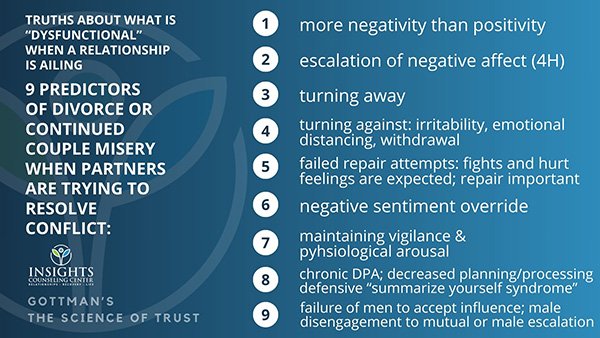Is Your Relationship at Risk? The 9 Behaviors That Predict Misery
Relationships are often described as a journey—sometimes smooth, sometimes rocky. While all couples face challenges, certain behaviors can predict whether a relationship will spiral into conflict and disconnection. Based on decades of research by Dr. John Gottman, these nine predictors of misery are warning signs every couple should know. By understanding and addressing them, you can stop unhealthy patterns and rebuild connection.
1. More Negativity Than Positivity
The foundation of any successful relationship is positivity. Gottman’s research reveals that in stable, happy relationships, there’s a ratio of five positive interactions for every one negative interaction. When negativity outweighs positivity, even small criticisms or dismissive remarks can snowball into larger feelings of resentment. If you find yourself stuck in a pattern of negativity, start by intentionally expressing appreciation and affection to tip the balance back toward positivity.
2. Escalation of Negative Affect
This predictor includes the infamous “Four Horsemen of the Apocalypse”: criticism, contempt, defensiveness, and stonewalling. These destructive communication habits escalate conflicts rather than resolve them. For example, contempt—marked by sarcasm, eye-rolling, or belittling—is particularly corrosive to trust. To stop escalation, take a pause during arguments, reflect on what your partner is really trying to say, and respond with empathy instead of defensiveness.
3. Turning Against Your Partner
In moments of conflict, some partners turn against each other with irritability, emotional distancing, or even outright hostility. This response creates an environment of tension and distrust. Instead of turning against your partner, focus on staying present and addressing the issue at hand. Show that you’re willing to work together rather than against each other.
4. Turning Away
Equally harmful is the act of turning away from your partner. This happens when you ignore or dismiss their attempts to connect—whether it’s a casual question, a request for support, or a bid for affection. Over time, these small moments of disconnection add up, leaving your partner feeling rejected or invisible. Make an effort to recognize and respond to your partner’s bids for connection, even if it’s as simple as acknowledging their comment or giving them a hug.
5. Negative Sentiment Override
When negative sentiment override takes hold, you start interpreting everything your partner does through a negative lens. Even neutral or positive actions might feel threatening or insincere. This distorted view can fuel mistrust and misunderstandings. To combat this, try to focus on your partner’s positive intentions. Practice gratitude and remind yourself of the things you appreciate about them.
6. Failed Repair Attempts
Repair attempts are those small moments where one partner tries to ease tension or make amends during a conflict—a joke, an apology, or a kind gesture. When these attempts fail, it’s often because both partners are too entrenched in their anger or hurt to respond. Learning to recognize and accept repair attempts can make a huge difference in resolving conflicts. It’s not about who’s right; it’s about protecting the relationship.
7. Chronic Diffuse Physiological Arousal (DPA)
DPA refers to the physical and emotional state of being constantly on edge. When you’re in a state of heightened arousal—your heart racing, muscles tense, and thoughts spiraling—it’s nearly impossible to communicate effectively. Chronic stress in a relationship can make conflicts feel like emergencies, even when they’re not. Practice self-soothing techniques, like deep breathing or taking a time-out, to calm your body and mind before engaging in a tough conversation.
8. Summarizing Yourself Syndrome
When arguments turn into defensive monologues, communication breaks down. This “summarizing yourself syndrome” happens when each partner focuses solely on reiterating their own perspective, rather than listening to the other. The solution? Shift your focus to understanding your partner’s point of view. Ask questions, reflect back what you hear, and show that you value their feelings.
9. Failure to Accept Influence
In healthy relationships, both partners are willing to compromise and accept influence from each other. A refusal to do so—often seen when one partner dismisses the other’s opinions or preferences—can create a power imbalance and breed resentment. This is especially true when one partner consistently dominates decision-making. Practice being open to your partner’s input and show them that their voice matters.
Breaking the Cycle
The good news is that recognizing these predictors of misery is the first step toward change. Addressing these patterns requires effort and commitment from both partners, but it’s entirely possible to shift toward healthier, more constructive dynamics. Here are some actionable steps to start:
Identify your triggers: Pay attention to the moments when negativity, defensiveness, or withdrawal creep in. Talk openly with your partner about how these patterns affect both of you.
Prioritize repair: After a conflict, make an effort to reconnect. Acknowledge what went wrong, apologize if necessary, and affirm your commitment to the relationship.
Seek help when needed: Sometimes, breaking out of destructive patterns requires outside support. Working with a trained therapist can help you and your partner rebuild trust and improve communication.
Cross-Reference: The Path to Happiness
If these behaviors feel familiar, don’t lose hope. Change is possible, and understanding the predictors of misery can empower you to create a more fulfilling relationship. To learn about the flip side—the seven signs of happy, stable relationships—check out our companion blog post: "The 7 Signs of a Happy and Stable Relationship."
Every relationship faces challenges, but with the right tools and support, you can overcome them. At Insights Counseling Center, we specialize in helping couples break free from destructive patterns and build stronger, healthier connections. Schedule a session with one of our trained therapists today, and take the first step toward a more fulfilling relationship.

